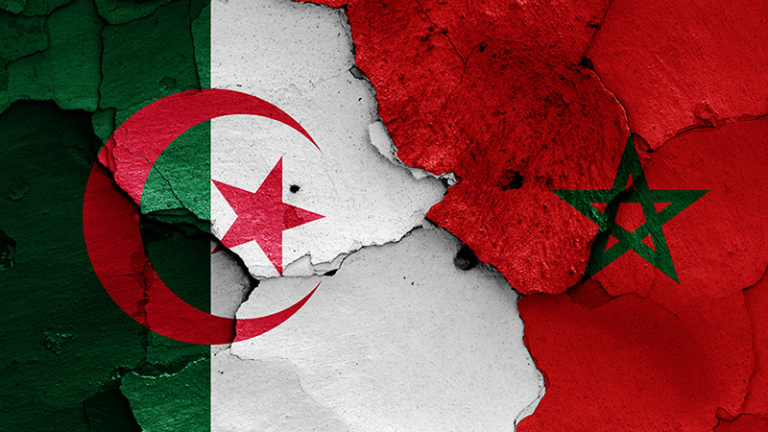
Across history, armed conflicts and diplomatic animosity in Northern Africa has been the status quo. The high level of instability we see in the region today is so deeply rooted into their history that the ruling of peace seems unimaginable. The colonialist exploitation in the area, added to the current interests from global-north countries makes it seems as if these disputes are profitable, and serve as a gateway for influence from major powers over these regimes. On this article, we’ll analyse the situation between Morocco and Algeria.
While many may think that neighbouring countries are more likely to have a more amiable relationship, since having similar cultures, similar dialects, independence history and diplomatic weight, we see that in reality, a rough rivalry can emerge leading to a competition between the neighbours to determine who will have more international power and relevance. And that just might be the case for Algeria and Morocco.
As a matter of fact, tensions has once been so high, that it ultimately resulted in military collisions in 1963 and 1976, culminating to a highly dangerous border situation. Morocco’s monarchy became official rivals with the Algerian Republic. Territorial disputes fuelled the mentioned military conflicts, and aversion between the two became their populations’ preferred relationship status.
In 1991, civilian population at the border finally saw the violence quiet down, when Morocco and Algeria declared a ceasefire, compromising on a period of no violence, but not peace or conciliation between the two. Hostility between them was still quite present, until 2020 armed conflict rose again after Moroccan army dispersed a group of Saharawi demonstrators at the border of Western Sahara and Mauritania. The region went back into arms, and with Former President Donald Trump’s recognition of Moroccan sovereignty over the territory, things developed for the worse.
But Trump’s recognition didn’t come for free. In order to get such recognition, Moroccan government had to officially normalise its relations with Israel, ultimately isolating Algeria in the Western Sahara. All this happened in December of 2020, and progressed when Spain also expressed their support in favour of Morocco’s autonomy in the region. Algeria has once again, suffered a devastating defeat.
Algeria does hold high amounts of grievance against Spain. As a former coloniser over the area, Algeria claims that Spain is forgetting their historical role into creating all this instability in Western Sahara, and how they still have responsibility towards resolving the issue, and changing their status from neutrality, to supporting alongside the US, Morocco’s claim, seem for the Algerians as a biased decision based on hidden interests.
Personally, western interference in emerging countries, specially ones where they have historical ties to, always have underlying condition that go beyond the simply recognition or support a country in the region’s claim. The area seems to represent to players like the US, a large-scale board game, where they act when necessary to gain something, while promoting a speech of peace and international cooperation.
This is the main distinction between Algerian and Morocco’s international strength. As much as Algeria display a much larger array of resources, Morocco’s close ties to the influential west puts them in a place where alliances are more likely, and therefore, support for their plans of action in the Western Sahara region.
In March 2023, Algerian president made quite a few remarks regarding this long, ill, relationship. After severing relations with Morocco in 2021, president Abdelmadjid Tebboune said they the two countries have reached “the point of no return”. Of course, added to this, he blamed Morocco for all the conflicts, and their actions represent mere responses to attacks committed by their neighbour.
On the other end of the spectrum, Moroccan King Mohammed VI, expressed his desire for resolving all issues with Algeria, and for their border the be reopened amid the severed diplomatic ties. Their border has been closed since 1994, and Morocco has in fact expressed over the years their desire for it to be reopened, since the flow of civilians between the two most populous nations would be highly beneficial for both of them.
However, the peaceful speeches made by the King don’t seem to have been affecting Algerian president too positively, as of recent time, no movement has been done to allow us to assume that they can reach a friendly relationship once again. On the contrary, as stated, on the Algerian side, besides the territorial dispute with Morocco, the lack of support from countries like the US and Spain, and increasing tensions with Tel Aviv, resentment seems to be at an all time high.
In conclusion, the current situation between Morocco and Algeria seems to be just another conflict in Northern Africa where europeans colonisers and US interests helped build nations designed to never get out of their dependence, culminating in years of conflict that threaten the stability of the area.
REFERENCES:
https://politicstoday.org/morocco-algeria-tension-long-history-of-mistrust/
https://carnegieendowment.org/sada/87055
By The European Institute for International Law and International Relations.














